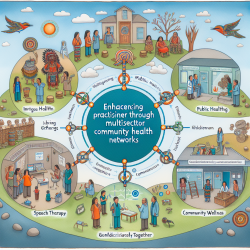Introduction
The quest for effective treatments for cocaine use disorder (CUD) is ongoing, given the significant public health implications of this addiction. A recent study titled Cannabidiol as a treatment for craving and relapse in individuals with cocaine use disorder: a randomized placebo-controlled trial provides valuable insights into the potential role of cannabidiol (CBD) in addressing this issue. As practitioners in the field of speech language pathology, it is crucial to stay informed about emerging research that could impact therapeutic practices, even those seemingly outside our immediate domain. This blog explores the study's findings and their implications for practice.
Understanding the Study
The study conducted by Mongeau-Pérusse et al. (2021) was a single-site, double-blind, randomized controlled trial. It aimed to assess the efficacy of CBD in reducing craving and preventing relapse among individuals with moderate to severe CUD. Seventy-eight participants were divided into two groups: one receiving 800 mg of CBD daily and the other a placebo. The trial included a 10-day inpatient detoxification phase followed by a 12-week outpatient follow-up.
Key Findings
The primary outcomes measured were drug-cue-induced craving during detoxification and time-to-cocaine relapse during outpatient treatment. The study found that CBD did not significantly reduce cocaine craving or prevent relapse compared to the placebo. During drug-cue exposure, craving scores increased similarly in both the CBD and placebo groups. Furthermore, almost all participants relapsed by week 12, with no significant difference in relapse rates between the two groups.
Implications for Practitioners
While the study did not demonstrate a significant effect of CBD on craving or relapse prevention, it highlights the importance of rigorous research in developing effective treatments for addiction. As practitioners, we can draw several lessons from this study:
- Evidence-Based Practice: This study underscores the need for evidence-based interventions in treating addiction. Practitioners should prioritize treatments with proven efficacy and remain cautious about adopting new therapies without substantial supporting data.
- Holistic Approach: The complexity of addiction requires a multifaceted approach. While pharmacological interventions like CBD are being explored, they should be integrated with psychosocial interventions for comprehensive care.
- Continued Research: The study's findings encourage further research into alternative treatments and combinations of therapies that might yield better outcomes for individuals with CUD.
Encouraging Further Research
For practitioners interested in contributing to the field, this study serves as a reminder of the critical role research plays in advancing our understanding of addiction and its treatment. Consider engaging in or supporting research efforts that explore innovative therapeutic approaches, including the potential use of CBD and other cannabinoids in addiction treatment.
Conclusion
While CBD did not show efficacy in reducing craving or preventing relapse in CUD, the study by Mongeau-Pérusse et al. (2021) provides valuable insights into the challenges of developing effective addiction treatments. Practitioners should remain committed to evidence-based practice and consider the broader implications of emerging research in their therapeutic approaches. To read the original research paper, please follow this link: Cannabidiol as a treatment for craving and relapse in individuals with cocaine use disorder: a randomized placebo-controlled trial.










